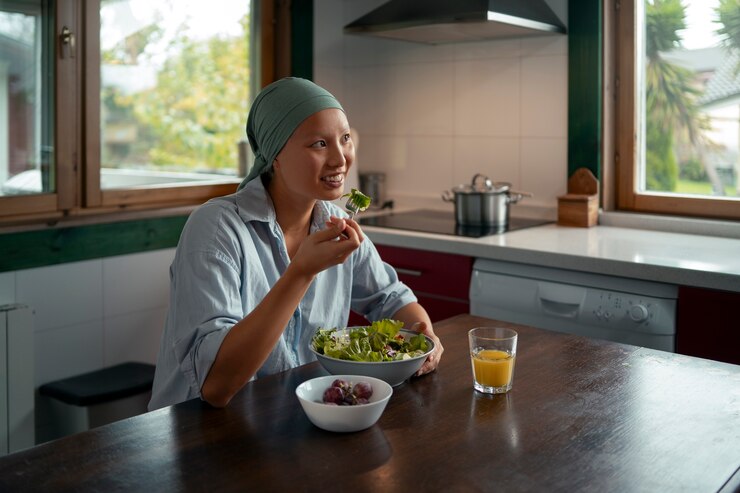Ask Ayurvedic doctor a question and get a consultation online on the problem of your concern in a free or paid mode. More than 2,000 experienced doctors work and wait for your questions on our site and help users to solve their health problems every day.
Cancer: Insights from Ayurveda

Key Takeaways
- Ayurveda views cancer as an imbalance in the body's doshas, offering a unique perspective that aligns ancient principles with modern understanding.
- Herbal remedies in Ayurveda focus on cancer prevention, highlighting the use of natural ingredients to potentially reduce cancer risk.
- Ayurvedic practices can boost immunity, strengthening the body's defenses against illnesses, including cancer.
- Dietary recommendations in Ayurveda emphasize foods that promote a balanced lifestyle and may help lower the risk of cancer.
- Ayurvedic treatments can complement conventional cancer therapies, supporting healing and improving quality of life through holistic methods.
Exploring the Ayurvedic perspective on cancer opens a window into ancient wisdom that looks at the body and mind as a whole. In Ayurveda, cancer is seen not just as a physical ailment but as an imbalance of the body's natural energies, known as doshas. This holistic view contrasts with the Western medical approach, which often focuses more on treating symptoms rather than the root cause.
The article will delve into how Ayurvedic practices, such as herbal remedies and lifestyle changes, might play a role in cancer prevention and management. We will discuss the potential of immune-boosting Ayurveda techniques that have been cherished for centuries. By integrating these insights, you might discover new ways to support your well-being and explore alternative health strategies. Let's embark on this enlightening journey into the world of Ayurveda and its unique take on cancer.
Herbal Cancer Prevention Tactics
In Ayurveda, herbal remedies have long been used to help prevent cancer. Herbs like turmeric and ashwagandha are known for their potential cancer-fighting properties. Turmeric contains curcumin, which has been shown to reduce tumor growth in some studies. Ashwagandha may help by reducing stress, thus boosting the immune system.
A study from the National Cancer Institute found that people who consume more turmeric have a lower risk of certain cancers. This shows how traditional herbs can be valuable in modern preventive strategies.
Using these herbs in daily life might support your wellness journey. Adding them to your diet in simple ways, like teas or soups, can be a step towards healthier living. Herbal cancer prevention isn't just about taking herbs; it's about integrating them into a balanced lifestyle.
Boosting Immunity with Ayurveda
In the world of Ayurveda, boosting your immunity isn't just a trend—it's a way of life. This ancient Indian practice sees the body as a complex system that needs balance and harmony. When it comes to fighting diseases like cancer, Ayurveda emphasizes strengthening the immune system to prevent illness.
The concept is simple: a strong immune system acts like a shield, protecting us from potential threats. Using natural methods, Ayurveda focuses on herbs, diet, and lifestyle changes. For instance, herbs like Ashwagandha and Turmeric are known for their immune-boosting properties. They work by enhancing your body's natural defense mechanisms.
Ayurvedic practices also suggest a balanced diet rich in fruits, vegetables, and whole grains. These foods are packed with antioxidants, which help eliminate harmful toxins from the body. Additionally, regular exercise and mindfulness practices like yoga and meditation are encouraged to maintain a healthy state of mind and body.
A great quote by Dr. Deepak Chopra encapsulates this idea:
"The best way to keep your immune system strong is to live in harmony with nature."
-Deepak Chopra
The takeaway here is clear. By integrating simple Ayurvedic principles into daily life, you can significantly enhance your immune system's strength. This holistic approach not only helps in cancer prevention but also nurtures overall health and well-being.

Dietary Practices in Ayurveda
Ayurveda, a traditional system of medicine from India, places a strong emphasis on diet as a fundamental aspect of health and healing. The approach is not just about what you eat, but how you eat it. According to Ayurveda, food should be fresh, seasonal, and suited to your individual body's constitution, known as 'dosha.' There are three doshas: Vata, Pitta, and Kapha, and each person has a unique combination of these energies.
One fascinating aspect of Ayurvedic dietary practices is the concept of 'Agni,' or digestive fire. Agni is believed to be responsible for the digestion and metabolism of food. Keeping this fire strong is vital, as weak Agni can lead to the buildup of toxins, or 'ama.' To support Agni, Ayurveda suggests eating warm, cooked meals rather than raw foods, especially during colder seasons.
Statistics show that around 80% of Indian households still use some form of Ayurvedic principles in their daily diet. This widespread acceptance reflects the enduring relevance of these practices in maintaining health. The focus is on balance: incorporating all six tastes—sweet, sour, salty, bitter, pungent, and astringent—in each meal to promote overall well-being.
Spices are another essential part of Ayurvedic cooking. Spices like turmeric, cumin, and ginger not only add flavor but are also believed to aid digestion and boost the immune system. For example, turmeric contains curcumin, known for its anti-inflammatory properties.
Proper meal timing is also crucial. Ayurveda recommends consuming the largest meal at midday when the digestive fire is strongest. Light dinners are encouraged to support restful sleep and easy digestion. By aligning your eating habits with Ayurvedic principles, you can foster a harmonious relationship between body and food.

Ayurvedic Treatments for Cancer
Ayurvedic treatments bring a fresh perspective to cancer care, blending ancient wisdom with modern needs. This approach focuses on balancing the body's energies, which are believed to play a role in health and disease. Herbs like turmeric and ashwagandha are often highlighted for their potential benefits in cancer management. These herbs are said to help with inflammation and boost the body's natural defenses.
Diet plays a big part in Ayurveda, too. Eating the right foods can be as crucial as taking medicine. Foods rich in antioxidants are suggested, aiming to strengthen the body's ability to fight off illness. It's about nourishing the body to create a supportive environment for healing.
Ayurveda also places importance on the mind-body connection. Practices such as yoga and meditation are encouraged to reduce stress, which can impact health. By calming the mind, you might be able to support the body's healing processes more effectively.
Engaging with Ayurveda can offer a different view on health and wellness. It emphasizes a holistic way of living, aiming to treat the person, not just the disease. If you're curious about exploring Ayurvedic options, consider consulting with a qualified practitioner.
Your thoughts and experiences matter. Share your journey or ask questions about Ayurveda and cancer in the comments. Spread the word by sharing this article with those who might benefit from it. Dive into related topics to discover more about how Ayurveda may complement your health journey.
FAQ For Cancer
What is Cancer in Ayurveda?
In Ayurveda, cancer is considered a result of imbalances in the body's doshas—Vata, Pitta, and Kapha. These imbalances disrupt the natural harmony and may lead to the formation of abnormal growths, analogous to tumors in modern medicine. Ayurveda emphasizes restoring balance through natural means to address these disruptions.
How can herbal remedies help in preventing cancer?
Herbal remedies in Ayurveda focus on detoxifying the body, reducing inflammation, and enhancing overall well-being. Herbs like turmeric, ashwagandha, and neem are believed to have cancer-preventive properties due to their antioxidant and anti-inflammatory effects. Regular use of these herbs can potentially lower cancer risk by maintaining bodily balance.
What are some ayurvedic practices to boost immunity?
Ayurveda recommends practices like daily oil massage (Abhyanga), yoga, and pranayama (breathing exercises) to boost immunity. Additionally, herbs such as tulsi, giloy, and amla are used for their immunomodulatory effects, enhancing the body's natural defenses against illnesses, including cancer.
What dietary practices does Ayurveda recommend for cancer prevention?
Ayurveda suggests a diet rich in fresh fruits, vegetables, whole grains, and herbs that align with one's dosha type. Foods like leafy greens, berries, and spices such as ginger and garlic are encouraged. These foods support detoxification and provide essential nutrients that may lower the risk of cancer.
Can Ayurveda be used alongside conventional cancer treatments?
Yes, Ayurveda can complement conventional cancer treatments by alleviating side effects and improving quality of life. Techniques such as meditation, herbal supplements, and dietary adjustments are used to support the body, reduce stress, and promote healing. However, it is important to consult with healthcare professionals to ensure integrated care.
Are there any specific ayurvedic treatments for different types of cancer?
Ayurvedic treatments are personalized based on the individual's constitution and specific type of cancer. Therapies might include Panchakarma (detoxification processes), targeted herbal formulations, and lifestyle changes. The aim is to balance the doshas and support the body's natural healing mechanisms.
Is it safe to rely solely on Ayurveda for cancer treatment?
While Ayurveda offers valuable support in cancer care, it is not recommended to rely solely on it for treatment. Conventional medical treatments such as surgery, chemotherapy, and radiation are essential for addressing cancer effectively. Ayurveda should be viewed as a complementary approach to enhance overall well-being and support recovery.

